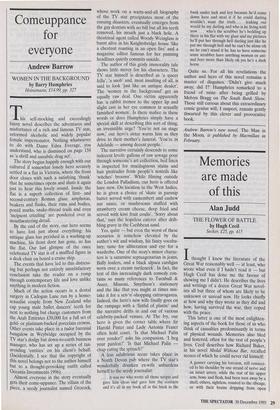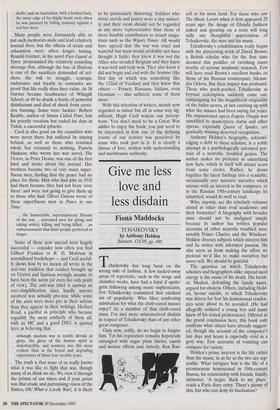Memories are made of this
Alan Judd
THE FLOWER OF BATTLE by Hugh Cecil Secker, £25, pp. 415 Ithought I knew the literature of the Great War reasonably well — at least, who wrote what even if I hadn't read it — but Hugh Cecil has done me the favour of showing me I didn't. He describes the lives and writings of a dozen Great War novel- ists all but three of whom are likely to be unknown or unread now. He looks chiefly at how and why they wrote as they did and how, having survived the war, they coped with the peace.
This latter is one of the most enlighten- ing aspects of the book for those of us who think of casualties predominantly in terms of physical wounds. Memories also bled and festered, often for the rest of people's lives. Cecil describes how Richard Baker, in his novel Medal Without Bar, recalled scenes of which he could never rid himself:
A gunner carrying his forearm, still connect- ed to his shoulder by one strand of nerve and an intact artery, while the rest of his upper arm, bone and flesh, had been torn away by a shell; others, sightless, roasted to the ribcage, or with their brains dripping from open skulls; and an Australian, with a broken back, the inner edge of his thighs burnt away when he was jammed by falling masonry against a red-hot stove.
Many people were fortunately able to put such memories aside and lead relatively normal lives, but the effects of strain and exhaustion were often longer lasting. Ronald Gumer, in his novel Pass Guard at Ypres, propounded the relatively consoling message that, although the loss of illusions is one of the sacrifices demanded of sol- diers, the will to struggle, courage, endurance and loyalty to comrades are proof that life really does have value. At 38 Gumer became headmaster of Whitgift School; at 49 he drank a bottle of powerful disinfectant and died of shock from corro- sive burning. Some were luckier: Robert Keable, author of Simon Called Peter, lost his priestly vocation but ended his days in Tahiti, a successful sybarite.
Cecil is also good on the casualties who were never there but suffered by staying behind, as well as those who returned whole but returned to nothing. Pamela Hinkson, who wrote her war novel, The Victors, as Peter Deane, was one of the first kind and wrote about the second. Her brothers became two of very many super- fluous men, finding that the peace had no place for them. Men who had jobs in 1918 had them because they had not been 'over there' and were not going to give them up to those who had. Oliver Onions wrote of these superfluous men in Peace in our Time:
. . . the honourable, supernumerary flotsam of the war. . . untrained save for giving and taking orders, killing and being killed. . . an embarrassment that most people preferred to forget.
Some of these now unread were hugely Successful — consider how often you find Gilbert Frankau or R. H. Mottram in secondhand bookshops — and Cecil useful- ly shows how by no means all wrote in the anti-war tradition that readers brought up on Graves and Sassoon wrongly assume to have been the norm (or even the only point of view). The anti-war label is anyway an over-simplification since hardly anyone involved was actually pro-war, while some of the antis were more pro in their actions than they appear in their writings. Herbert Read, a pacifist in principle who became arguably the most soldierly of them all, with an MC and a good DSO, is quoted here as believing that
although modern war is totally devoid of glory, the glory of the human spirit is indestructible, and nowhere was this more evident than in the brutal and degrading experiences of those four terrible years.
The truth is that none of us really knows what it was like to fight that war, though many of us think we do. We view it through the prisms of our times and if your prism was that crude and patronising vision of the Sixties, Oh! What a Lovely War!, it is likely to be particularly distorting. Soldiers who wrote novels and poetry were a tiny minori- ty and their views should not be regarded as any more representative than those of more humble contributors to trench maga- zines such as the Wipers Times. All would have agreed that the war was cruel and wasteful but most would probably not have thought it futile; they knew it was not the Allies who invaded Belgium and they knew it was well and truly won. They also knew it did not begin and end with the Somme (the first day of which was something like the 132nd of Verdun) and they knew that others — French, Russians, Italians, even Germans — also suffered, some of them more.
With this selection of writers, mostly now regarded as minor but all in some way sig- nificant, Hugh Cecil widens our percep- tions. You don't need to be a Great War addict to enjoy the book; you just need to be interested in how one of file defining events of our century was perceived by some who took part in it. It is clearly a labour of love, written with understanding and unobtrusive authority.



















































 Previous page
Previous page